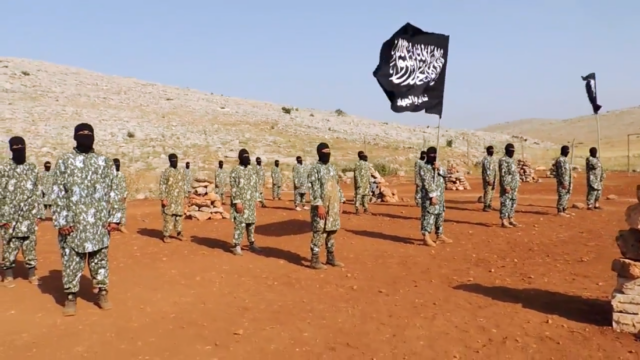Brief: Indonesia Arrests Uzbek Militants in Latest Central Asian Jihadist Sting

On April 5, Densus 88, Indonesia’s elite terrorist unit, announced that four Uzbek nationals had been arrested in Indonesia after they traveled to that country from Turkey via Abu Dhabi and Malaysia (kompas.com, April 5). They had all left Syria ahead of a media foray by their group Katibat Tawhid wal-Jihad (KTJ) in February. Founded in 2015 alongside another Uzbek jihadist group in Syria, the Imam Bukhari Battalion (IBB), the KTJ has proved more resilient than the now-defunct IBB, perhaps because of the KTJ’s broader international networks (see Terrorism Monitor, 1 July 2016 ).
In March, just before the latest arrests, KTJ published a series of photos showing its Emir and Sharia officials Ustaz Abdulaziz and Ustaz Ahluddin Navqati respectively inspecting fortified positions in Idlib (Twitter/@G88Daniele, March 24). Prior to this publication, KTJ had also published images of its fighters in fortified positions and provided emergency relief to victims of the Idlib earthquake (Twitter/@G88Daniele, January 27). KTJ has accordingly become a key force multiplier for Hayat Tahrir al-Sham (HTS), allowing the formerly al Qaeda-affiliated (and now nominally independent) jihadist group to retain power in Idlib and prevent the Syrian government from to reassert their power authority there (voanews.com, October 13, 2022).
One of the KTJ members arrested in Indonesia was responsible for providing financial support and forged documents to their compatriots fighting in Idlib. The other three had been trained in KTJ camps and assisted the group in producing high-quality propaganda (kompas.com, April 5). Not assuming the men were harmless, they tried to escape custody by stealing a knife and cutting a hole through the ceiling of their cell, killing an immigration officer on April 11 (dailyexpress.com.my, April 11). April). The KTJ members apparently took advantage of the officer’s preparation of the Ramadan meal. The group was said to have been particularly motivated to flee by the visit of Uzbek consular officials, who feared the possibility of an especially severe punishment on their return.
The previous arrests of other KTJ members in South Korea with similar profiles shows that the group may not have a safe haven in Turkey – and is looking for other countries where it can set up logistics and financial centers – but is being tracked down by counter-terrorist agencies successfully (yna .co.kr, February 16). KTJ could also have trouble recruiting militants, as conflicts in places like Ukraine mean greater demand for fighters worldwide. Both the Russian Wagner Group and the Russian army itself have reportedly paid Uzbek migrants in Russia — including prisoners and former combatants in Afghanistan — to fight on Russia’s behalf in their war against Ukraine (Ozodlikradiosi, March 3, 2022 ; gazeta.uz, September 13.12.2022). Therefore, Uzbeks, who may have earlier joined KTJ out of interest in travel, adventure and money rather than ideological reasons, may now be fighting in Ukraine.
If other Uzbeks attempt to travel to Indonesia for reasons similar to those of the four most recent KTJ detainees, their efforts are likely to fail. Indonesia will certainly be wary of Central Asian militants after these arrests and similar ones in South Korea. There are relatively few Uzbeks in Indonesia, so the new arrivals are likely to stand out. In addition, Indonesia has already managed to track down and arrest several cells of the Uyghur-led Turkistan Islamic Party (TIP), which had tried to seek refuge and train with Indonesian jihadists (benarnews.org, October 13, 2020). It remains to be seen whether the closure of the international operations space for KTJ in Indonesia, South Korea and Turkey will ultimately affect KTJ operations in Idlib itself.